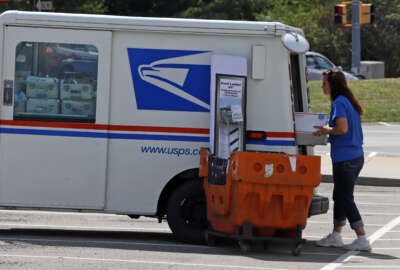USPS pilot expands postal banking services after years of skepticism
USPS is moving ahead with the pilot after receiving nearly a decade of postal banking proposals from Congress with reluctance.
The Postal Service, after years of skepticism, is quietly moving ahead with plans to expand its banking services.
USPS launched the pilot program on Sept. 13, which allows customers to cash payroll and business checks in the form of gift cards.
For a flat fee of $5.95, customers can purchase a single-use gift card of up to $500, using business or payroll checks as payment. USPS won’t accept checks larger than $500, and won’t disburse cash for any checks.
USPS spokeswoman Tatiana Roy said the USPS is running the pilot in collaboration with the American Postal Workers Union, and called it “an example of how the Postal Service is leveraging its vast retail footprint and resources to innovate.”
“Offering new products and services that are affordable, convenient and secure aligns with the Postal Service’s Delivering for America 10-year plan to achieve financial sustainability and service excellence,” Roy said in a statement.
Four post office locations are currently participating in the pilot in Washington, D.C.; Baltimore; Falls Church, Virginia and the Bronx, New York.
The agency already offers some basic financial services, including money orders, electronic funds transfers and cashing checks issued by the Treasury Department, but would need legislation to take on more robust services at its more than 34,000 retail locations.
The Congressional Research Service notes USPS offered some financial products in the 20th century, but they haven’t been available since the agency terminated the Postal Savings System in 1967.
USPS is moving ahead with the pilot after receiving nearly a decade of postal banking proposals from Congress with reluctance.
Sens. Kirsten Gillibrand (D-N.Y.) and Bernie Sanders (D-Vt.) joined Reps. Alexandria Ocasio-Cortez (D-N.Y.), Marcy Kaptur (D-Ohio) and Bill Pascrell (D-N.J) in April to introduce the latest postal reform banking effort.
The coalition urged their colleagues to include a postal banking provision in the fiscal 2022 spending bill. The lawmakers said banking services would help the Postal Service generate $9 billion a year in revenue.
Lawmakers have introduced many bills in recent years to expand postal banking, but USPS leadership hasn’t embraced these proposals as a viable way to address its long-term financial problems.
Former Postmaster General Patrick Donahoe dismissed the idea of postal banking before his retirement in 2015.
USPS, under his successor, Megan Brennan, said it would remain open to offering more financial services, but expressed some reservations about branching out into non-delivery services.
“Our core function is delivery, not banking,” the agency wrote in July 2016. “To the extent our research concludes that we can legally provide additional services at a profit and without distracting from our core business, we would consider these. However, public policy and regulatory discussions must be addressed before the Postal Service invests in an area outside our core function.”
Causten Rodriquez-Wollerman, deputy director of the American Civil Liberties Union, said legislation expanding the postal banking program would help millions of unbanked and underbanked Americans. He said 59% of ZIP codes don’t have a bank, but every ZIP code has at least one post office.
“This program is the bare minimum, but the Postal Board of Governors need to do much more,” Rodriquez-Wollerman said.
Paul Steidler, a senior fellow at the Lexington Institute, said the banking pilot distracts from the Postal Service’s central mission of delivering the mail.
Rapid changes in banking technology, he added, could make it hard for the Postal Service to afford and maintain banking systems.
“The Postal Service processes and delivers billions of pieces of mail and packages. It is not a financial services firm. It comes down to introducing a new business line at probably the worse time imaginable when they are struggling with profitability and struggling to get through the pandemic,” Steidler said.
A 2018 task force led by the Treasury Department encouraged USPS to consider new sources of revenue, such as offering state hunting and fishing licenses. But the task force discouraged the agency from pursuing additional banking services.
“Given the USPS’s narrow expertise and capital limitations, USPS should not pursue expanding into new sectors, such as postal banking, where the USPS does not have a demonstrated competency or comparative advantage, or where balance sheet risk would be added,” the task force wrote in its final report.
Copyright © 2025 Federal News Network. All rights reserved. This website is not intended for users located within the European Economic Area.
Jory Heckman is a reporter at Federal News Network covering U.S. Postal Service, IRS, big data and technology issues.
Follow @jheckmanWFED





